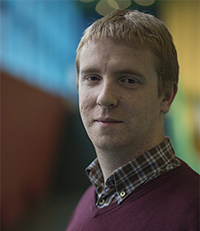From October 2016, TU Delft assistant professor Roeland De Breuker spent four months working for Airbus Group Innovations in Munich. Having taken the ‘academic route’ through TU Delft (student – PhD – lecturer), it was time for a break. De Breuker took the sabbatical to broaden his horizons and it proved to be a positive experience. A double interview with De Breuker and his former manager at Airbus, Andreas Wildschek.
Roeland de Breuker is an assistant professor in the Aerospace Structures and Computational Mechanics group at TU Delft’s faculty of Aerospace Engineering. ‘I’ve been at the faculty for some time. I studied here, took my doctorate here, and now work here as a lecturer. I’d been working for the faculty for over ten years, and in my view it was time to gain some new personal and professional experience. I thought it would be interesting to take a look behind the scenes at a company, but I didn't want to leave TU Delft.’
TU Delft offered the opportunity to take a sabbatical. De Breuker: ‘There’s a clear procedure in place. First you talk to Human Resources and your direct supervisor, and in the end it’s approved by the dean. TU Delft recognises that sabbaticals can be valuable for staff and TU Delft alike. No one had ever done one at Airbus – not in Munich at least – so it took a few months to arrange everything. My Airbus badge was a different colour from everyone else’s, and they didn’t really know where to put me.’ New territory for Airbus Group Innovations, in other words. But now that it’s been done once, it can be done again, explains Wildschek. ‘Roeland brought lots of new ideas with him, and it was refreshing to have an external perspective on our work. He proved to be a valuable addition to our research team.’
Different discussions
De Breuker discovered that working with industry is quite different from working for industry. ‘I have developed a better feel for what they consider to be important and how they see the future. Once I was actually there, I had different discussions, and that’s interesting. Evidently, it makes a difference whether you’re at the table as a scientist or as a fellow engineer.’ De Breuker was also struck by the way in which Airbus Group Innovations works: ‘They always have the end product in mind. At first, I thought that their approach would be, “it doesn’t matter how it works, so long as it solves the problem”. But I have a different impression now. The research is fairly applied, but they really want to know how something works and they take the time to develop a long-term vision. It doesn’t all necessarily have to be part of an aeroplane in five years’ time. Just like at Delft, attention is also paid to innovations with a lower TRL [Technology Readiness Level; this indicates the stage that a technology is at, from idea to application]. It’s not all that different.’
Wildschek: ‘We have joint research topics and joint research objectives. By combining our expertise and forces, we can make more rapid progress and work more efficiently. It’s also led to an agenda for future research cooperation.’ ‘And a shared doctoral student,’ mentions De Breuker. ‘There was a doctoral candidate at Airbus who had previously been involved in one of our joint European projects. We had further discussions about this when I went to work at Airbus, and now Chiara [ed.: Bisagni, professor of Aerospace Structures and Computational Mechanics at TU Delft] is his promotor and I am his co-promotor.’
'Collaboration is truly the key to progress'
What lessons have been learned? De Breuker: ‘We could also pay more attention to the end product at times. Fundamental questions are important, but as engineers – for in the end, we are primarily engineers – we should keep asking ourselves: why do we need this answer? We should avoid situations in which we do research and publish the results, and then they languish in a drawer. We have a duty to maintain a balance between discovering and creating.’
Would he recommend it to others? Wildschek has no doubts: ‘Collaboration is truly the key to progress. And it really does work best if you actually sit round a table together, at least for a certain amount of time.’ De Breuker agrees: ‘And I would advise anyone who wants to do a sabbatical to think carefully beforehand about what they want to get out of it, besides personal development. If you keep that in mind from day one, you may create a truly sustainable and valuable partnership in very little time at all.’
Do you work for TU Delft and would you also like to find out more about opportunities for taking a sabbatical? Check out the Employee Portal.
